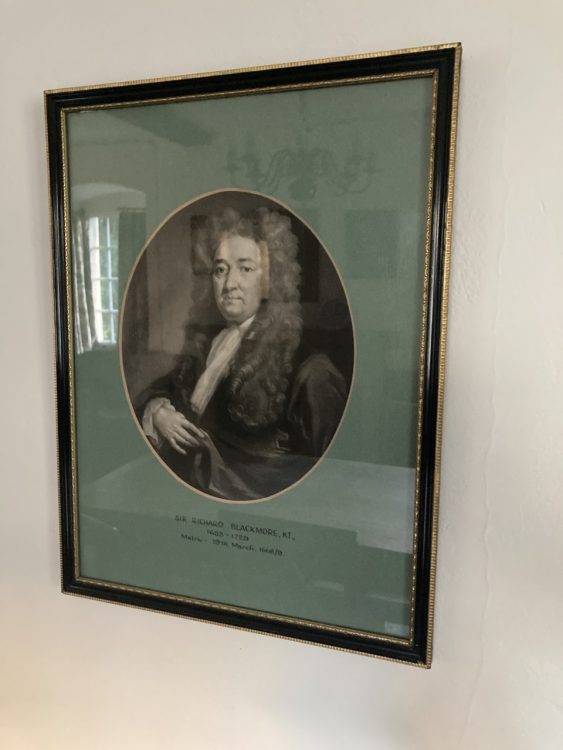Sir Richard Blackmore—The Worst English Poet?
2 Dec 2020|Tom MacFaul
- Research

Teaching in the Hearne Room as I often do, my eyes are sometimes drawn to the portrait there of Sir Richard Blackmore (St Edmund Hall, 1669). Blackmore is best known as one of the major targets of Alexander Pope’s satire in Peri Bathous, as an exemplar of ‘the art of sinking in poetry’, and as ‘everlasting’, ‘sonorous Blackmore’, ‘who sings so loudly, and who sings so long’, a poet so dull he sends a crowd of lawyers to sleep at the end of Book II of The Dunciad. We read Pope; no one reads Blackmore. Could a great injustice have been done? Infused with a feeling of Hall Spirit, I decided to find out. I would read Teddy Hall’s most eminent epic poet.
This was not going to be an easy matter, I realised. The original DNB entry for him claims ‘Never was a man afflicted with a scribendi cacoëthes more incurable.’ Blackmore wrote more epics than Homer, Virgil and Milton put together (all this alongside his day job as an eminent physician). I would read just one, his first, Prince Arthur (1695), at least to start off with….
Well, it’s certainly an ambitious poem: telling the story of Prince Arthur fighting for his kingdom against the godless Saxons, it attempts to overgo Virgil and Milton, to explain the whole of Christian doctrine, and to celebrate the ‘Glorious’ Revolution of 1688. He probably deserved the knighthood the new King, William III, gave him on the strength of this effort.
The poem opens with an obvious echo of the beginning of the Aeneid:
I sing the Briton, and his Righteous Arms,
Who bred to Suff’rings, and the rude Alarms
Of bloody War, forsook his Native Soil,
And long sustained a vast Heroick Toil,
Till kinder Fate invited his Return,
To bless the Isle, that did his Absence mourn:
To re-enthrone fair Liberty, and break
The Saxon Yoke, that gall’d Britannia’s Neck.
The idea of the recovery of ‘Liberty’ is central to the language in which the 1688 Revolution was justified. The deposition of James II and the installation of his Dutch nephew/ son-in-law as King is reframed: our hero is a Briton, returning to his homeland, not an invading foreigner. The oppressor, meanwhile, is presented as alien in a couple of ways: not only is he Saxon, but there’s a nice pun on the Gallicness of the Catholic Stuart (whose mother was French) in the word ‘gall’d’. Blackmore quite neatly applies his Virgilian and Galfridian material to the current state of the nation, but with none of the complexity which Dryden would manage in his Aeneis translation published a couple of years later.
Blackmore’s quality control is not great. As the passage quoted above suggests, he’s apt to take a long time to say something quite simple, stuffing his lines with unnecessary adjectives. Do we really need to be told that war is ‘bloody’, or liberty ‘fair’? Still, the verse bounces along quite mellifluously: Pope’s claim that Blackmore is ‘sonorous’ could (just about) be reclaimed as a compliment.
There are some jarring moments. When Arthur and his men escape a storm, they settle down in Brittany to a feast, washed down with ‘Rich Wine of Burgundy, and choice Champagne’. Very nice for them, to be sure, but does it really feel like they’re in Arthurian times? Even Blackmore himself seems a bit uneasy when he introduces a fire-ship into his sea battle, but not enough to deter him. Similarly, after the description of the Creation, we’re told that the Angels in Heaven celebrate with ‘rare Fireworks’. Pope was probably right to suggest that ‘The triumphs and acclamations of the angels, at the creation of the universe, present to [Blackmore’s] imagination the rejoicing of the Lord Mayor’s Day, and he beholds those glorious beings celebrating their creator, by huzzaing, making illuminations, and flinging squibs, crackers and sky-rockets’. (The angels also seem to have an ‘express’ postal service).
As is necessary for an epic poet, Blackmore has a way with simile. It’s just not a very good way. As Pope suggests, Blackmore tends to find similes from ‘all over the creation’, and isn’t terribly deft in his application of them. When some messengers bring the good news that Arthur will be received by the King of Brittany, his joy is lengthily compared to Jacob’s at hearing of Joseph’s survival in Egypt. It is, to say the least, a bit strained, but it’s of a piece with Blackmore’s desire to include everything he knows in his epic. We get the Creation, the Fall, the Crucifixion, the Last Judgement (and the story of Arthur is left on the back-burner a bit). It’s all good fun, though (his Last Judgement is particularly good, with gruesome descriptions of the damned recovering their bodies and finding them to be monstrous; the saved, meanwhile, look on what they’ve escaped with bewildered relief). Will I be setting it to Teddy Hall students instead of Paradise Lost? Perhaps not. But perhaps they will have the chance to do it as well. If they wish. I’m all in favour of expanding the canon.
Category: Research
Author

Tom
MacFaul
Dr Tom MacFaul teaches English literature from the 16th to the 18th Century: he has particular interests in Shakespeare and other dramatists of his time, and Renaissance poets such as Donne, Spenser, Herbert and Milton. His research focuses on issues such as gender and sexuality, ecocriticism, and the representation of space. He also teaches dissertations on a wide variety of topics, from Renaissance poetry to contemporary fiction.